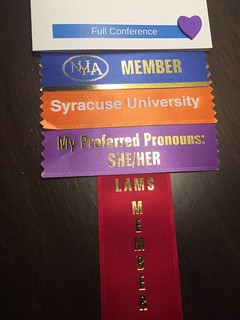
Freedom of Information and Open Meetings Laws, Robert Freeman
Freeman is the Executive Director of the NYS Committee on Open Government.
This could be a very boring topic but Freeman kept it lively with his humor and music quotes.
I learned that library board of trustee meeting are governed by the type of library it is (in NYS) and the law that corresponds. Freeman mentioned the Freedom of Information Laws and Section 268 of the Education laws. These laws govern when laws need to be open to the public, rules around announcing meetings, etc.
Some specific thoughts:
- Executive sessions require a vote of the majority of the board (not just those that are present).
- You cannot schedule an executive session, because going into an executive session depends on the vote. The agenda can note that an executive session is anticipated.
- Sunlight is the best disinfectant. In other words, being transparent is preferred.
- Email is not subject to opens meeting law. It is not simultaneous communication.
- Simultaneous communication would be subject to the open meetings law.
- It is a good practice to have dedicated email for board business. Email is subject to FIOL (Freedom of Information Law).
- NYS law contains a definition of what a record is.
- Opens meeting law given the public right to be there, but gives says nothing about their right to speak. You can establish reasonable rules that allow people to speak equally. If the board allows positive comments about its staff, it must allow negative comments. The board is not obligated to respond. “Thank you for your comment.”
- Records retention requirements established by the State Archives.
- Minutes of open meetings -minimal requirements - summary of actions taken, votes. Made available within two weeks. Nothing in law says that minutes must be approved. No need to include verbatim comments in the minutes.Must keep records (somewhere) of how people voted. Recordings of meetings must be kept for four months.
- No law about agendas.
- If there is discussion, materials should be available in advance.
- Cannot participate by phone.
I Still Don’t Want to Talk About It - This continues to be one of my most favorite NYLA sessions. One topic that caught my attention was about leaves of absence for those with health concerns. The Guide for the Family and Medical Leave Act is a great resource for understanding this. If you are a person, who thinks you will need to take a family or medical leave, or someone who has staff who are asking for a leave, this is a resources to consult.
Serving Refugees: Working Together as a Community - What was important about this session was understanding what process refugees go through, in order to come to the U.S., and then what resources are available to them once they are here. The screening process includes:
- 8 different government agencies
- 5 separate background checks
- 4 biometric security checks
- 3 in person interviews
Becoming a U.S. citizen is not easy and the test costs $725.
No comments:
Post a Comment